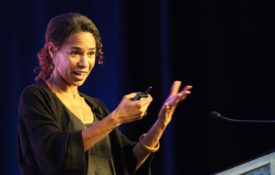-
Want to Raise Kind, Generous Kids? Take Them to an Art Museum
Entrepreneur parents work long hours building their companies to provide materially for their families and make sure they can offer their kids the best start in life. But most would probably agree that the monetary side of things is only part of the battle. Few parents would be satisfied if they gave their kids everything money can buy, but their children ended up rude, selfish, and self-absorbed. Everyone wants to raise successful kids, but a big part of being successful is being a kind and generous person. So how can parents give their kids the best while also doing their best to ensure they raise decent, thoughtful little people?
-
For Black Drivers, a Police Officer’s First 45 Words Are a Portent of What’s to Come
When a police officer stops a Black driver, the first 45 words said by that officer hold important clues about how their encounter is likely to go. Car stops that result in a search, handcuffing, or arrest are nearly three times more likely to begin with the police officer issuing a command, such as "Keep your hands on the wheel" or "Turn the car off." That's according to a new study in the Proceedings of the National Academy of Sciences that examined police body-camera footage of 577 routine car stops involving Black drivers. Eighty-one of these stops ultimately involved searches, handcuffings, or arrests.
-

Endless Love: You’ve Got Ideas About Consensual Nonmonogamy. They’re Probably Wrong
Podcast: In this episode of Under the Cortex, Amy C. Moors joins APS’s Ludmila Nunes and demystifies common misconceptions about consensually nonmonogamous relationships.
-

New Content From Perspectives on Psychological Science
A sample of research on transparency in characterizing past knowledge, psychology’s contributions to anti-blackness in the U.S., questioning the value of reflexivity statements in research, conceptions of self-control, and much more.
-

Peak Science: At 35, the APS Annual Convention Hits Its Stride
The 2023 APS Annual Convention began with a keynote by Catherine Alexandra Hartley (New York University) examining the causes and consequences of exploration across the lifespan.
-

Decades at the Helm: APS 2023 Convention Honors APS Founding Executive Director Alan G. Kraut
APS Founding Executive Director Alan G. Kraut received a special proclamation for his contributions to APS and the field more broadly.

